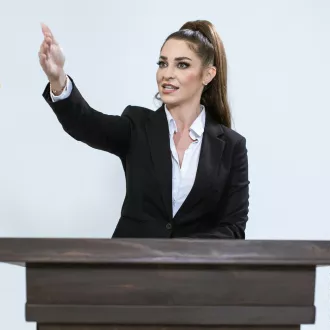Transcription The wedding speech
Each speech has its own characteristics that are related to the purpose of the speech. Voice, tone, emotional charge, among other factors, are parameters that can be adjusted by the speaker in order to recreate the atmosphere of the event to be held. One of the most traditional types of speeches practiced worldwide is the wedding speech. This communicative act is used during a wedding ceremony. There may be more than one speech, since we can find weddings where the bride and groom, friends and family proclaim their own.
When a speaker is hired to provide his services during these types of ceremonies, the aim is to deliver a professional speech that will contribute to liven up the ceremony. The role of the speaker during these events is critical in leading the ceremony and creating a positive emotional atmosphere. Through the development of this session, we will be analyzing some of the basic issues that revolve around this topic. This will be useful for you to make your first approaches to this type of speech.
Adaptability of the speech: Contrary to other types of speeches, which tend to be more rigid in their structures, the wedding speech is very adaptable to the tastes of the audience. Today's weddings have different characteristics from those of decades ago, since not all brides and grooms are looking for a ceremony full of extreme formalism. The speech has to be coherent with the event where it takes place, so the speaker must know how to adapt his tone, voice and language to the particular requirements of the ceremony.
The same applies to the speaking time: we must be precise with the length of the speech. In general, a ceremony of this style usually has a previous schedule, so our professionalism must be noticed by complying with the time periods that have been requested.
Relationship with the audience: The wedding speech is clearly focused on the bride and groom who intend to get married during the ceremony. This does not exempt the speaker from interacting with the rest of the audience and extending the impact of his message to everyone present. The speech should be balanced so that it positions the couple as the main reason for the event, focusing all the attention on them, but without forgetting the exchange with the audience.
To do this, we recommend interacting with some of those present. This can be done by mentioning some of the names of the most important family members and friends of the bride and groom or quoting phrases or anecdotes that relate them.
The emotional charge: As we said at the beginning of this session, the emotional charge of a wedding speech should be adapted to the particular event. Depending on the formality of the ceremony, we will use plainer or more complex language. The language used during the speech will allow you to add more or less emotional charge. When we express ourselves with simple words that promote a more relaxed atmosphere, it is possible to denote more emotion in our speech.
In any case, the speaker should try to convey strong and positive emotions. The message should be directed towards celebration, enthusiasm and joy of all those present. The importance of the step being taken and the opportunity to consolidate the relationship in order to build a future together should be emphasized. Similarly, we can dump part of the emotional burden on the parents and friends, who will have been present during the evolution of the engagement, being an essential piece in the trajectory of the couple. The key is to elaborate a message that manages to impact both the bride and groom and the rest of the audience.
wedding speech




